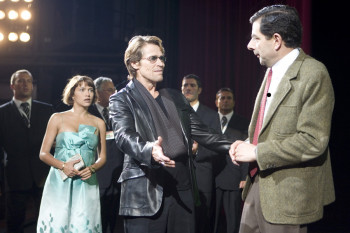(Through June 25, we are under the sway of Bizarro. Blame Piper at Lazy Energetic Eye Theatre.)
Mr. Bean’s Holiday
 My distate for the stone-faced British comedian Rowan Atkinson is well-documented, as is my loathing for his signature creation, Mr. Bean. I like subtle, sophisticated verbal comedy as much as the next guy, but Atkinson takes it too far; I’ve been with people who stare at his almost subliminal act without a hint of a smile, unaware that the turkey-on-the-head routine is a joke.
My distate for the stone-faced British comedian Rowan Atkinson is well-documented, as is my loathing for his signature creation, Mr. Bean. I like subtle, sophisticated verbal comedy as much as the next guy, but Atkinson takes it too far; I’ve been with people who stare at his almost subliminal act without a hint of a smile, unaware that the turkey-on-the-head routine is a joke.
But in spite of the insufferable Atkinson, I had reason to be hopeful about Mr. Bean’s Holiday.
For one thing, it co-stars Willem Dafoe, whose career has been filled with transcendent comic performances. Who could forget his inspired reading of “It is accomplished,” as he imbued the line with a resplendent irony unimagined by lesser actors? Or the tremendous gift he showed for physical comedy in Finding Nemo?
 For another, it takes place mostly in France, and there’s just something funny about the country – its language and its people. Oui! Comedy gold! Non! And the cherry: Gracias!
For another, it takes place mostly in France, and there’s just something funny about the country – its language and its people. Oui! Comedy gold! Non! And the cherry: Gracias!
Third, it includes a video camera, and the Cannes film festival, and a film set, so it has the opportunity to trenchantly comment on the sad state of cinematic culture, and to serve as an alternative, an example that film doesn’t have to be crass and crude and juvenile. It can speak to the human condition, and make you cry, and make you think, and change the world, all while making you shit yourself in convulsive fits of laughter. (As-tu sali ton pantalon? Tee hee!)
Mr. Bean’s Holiday had the potential to do all those things, but as a vehicle for Atkinson and his character, I tempered my expectations. Surely, despite its promise, the movie would fall under the tyrannical rule of Atkinson, and become another esoteric meta-comedy concerned with an obscure philosophical inquiry: Why does he padlock his car door?
Much to my surprise, the movie is an artistic triumph. And the catalyst, strangely, is a reinvention of Atkinson and the Bean character, stripping them of their idiosyncrasies and instead making them universal.
Part of the problem with Mr. Bean in his live-action television adventures was that he was conceived and performed so … weirdly. As one Pulitzer Prize-winning critic wrote:
“Mr. Bean is nearly mute, and fully child-like. He is all id. He has an insatiable curiosity – if he could sniff his own ass, he would – and refuses to acknowledge the existence of needs or desires beyond his own. Even poor, beloved Teddy suffers many indignities at the hands of his master. The only backstory is a suggestion at the opening of each show that Bean is an alien.”
Teddy is an example of the new attitude toward Bean, in the sense that Mr. Bean’s Holiday doesn’t even acknowledge his existence. You are dead to me, Teddy. It is almost as if, like Jason Bourne, Bean has been stripped of his past and most everything that made him “unique.” All that remains is the shell of the man, his outfit, and his instincts. By making Bean less specific and more broad, he is easier to relate to – a vessel for our hopes and dreams. He is everyman.
 This expansion of Bean’s meaning is even mirrored in the movie’s treatment of the automobile, as Mr. Bean encounters (and falls in love with) a car just like his – reinforcing our common humanity. We are all in the same cosmic voiture.
This expansion of Bean’s meaning is even mirrored in the movie’s treatment of the automobile, as Mr. Bean encounters (and falls in love with) a car just like his – reinforcing our common humanity. We are all in the same cosmic voiture.
But what lessons should we draw from this newly symbolic character? What is trying to impart?
The story involves Mr. Bean winning a trip to Cannes, as well as a video camera to document his journey. The plot is too complicated to delve into here, involving an assumed kidnapping, seafood, the intricacies of train travel, and the problem of what to do if you’re missing the last two digits of someone’s phone number. One obvious message: Be persistent; dialing 100 different numbers might be tedious – not to mention expensive – but how else are you going to eat up those 10 minutes of screen time?
To give you some sense of the narrative and thematic density at work here, there is a film within the film, and then Mr. Bean inserts some of his footage into that film, thus exposing the bankruptcy of the original and illustrating the classic wisdom that the best way to criticize a movie is to make another movie. Mr. Bean’s Holiday is, in short, a master class in film theory. Like the romantic score of Vertigo, it uses its shiny surface to lure and lull its audience, all the while subverting that light tone with a serious, rigorous meditation. Like Hitchcock’s classic, it’s broccoli dipped in rich, creamy chocolate.
That’s all well and good, of course, but it’s meaningless until we can excavate the movie’s thesis, and then digest it.
The key here is the opposition of the newly resonant Mr. Bean against Dafoe’s pompous, arrogant flimmaker, Carson Clay. While Clay is screeening his newest work – produced by, directed by, written by, and starring Carson Clay – the audience at Cannes is clearly suffering, bored silly by his narcissistic, masturbatory, formulaic, dead existential “thriller.” It is only when Mr. Bean gets into the projection booth that the audience sees truth, and life, and love, and the beautiful mess of … us. And they love it.
Film is dead, man. Video is real.
Mr. Bean’s Holiday is about nothing less than the democratization of cinema – the revolt of the common man against the elitist, auteur-ist status quo as the means of production become more accessible.
And leading your uprising is Mr. Bean, transformed here into a populist hero. Viva la resistance, enfoiré!


Bro. It’s a Mr Bean movie. Set your expectations lower in the first place so you don’t set yourself up for disappointment in the dumbest way possible.